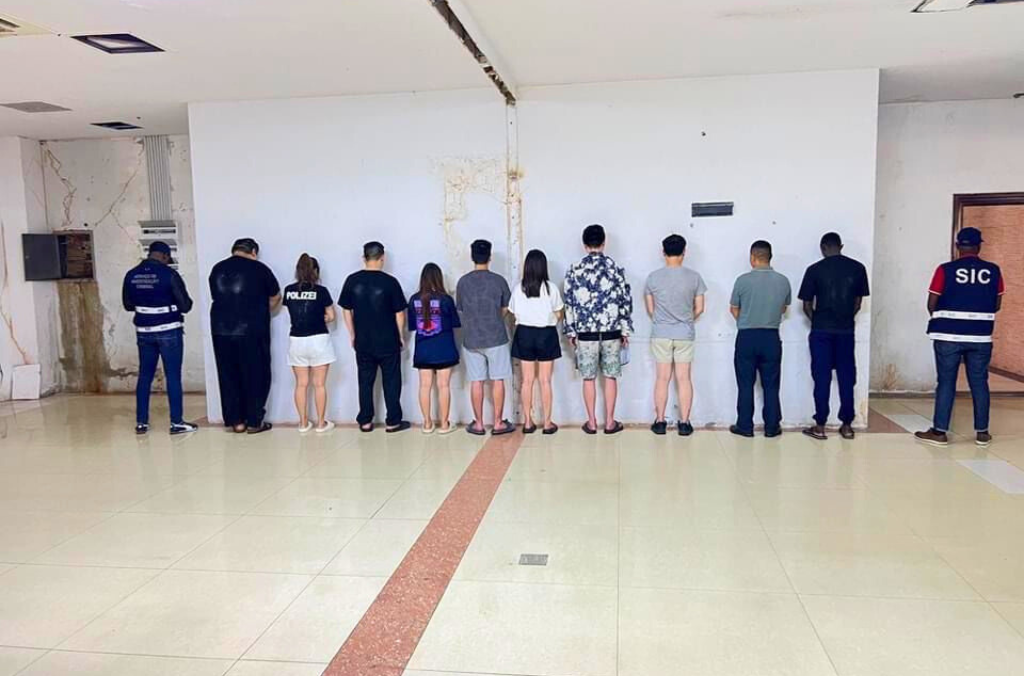- An INTERPOL cybersecurity operation that has arrested 1,006 suspects and the busting of 134,089 cybercrime networks in Africa underscores the urgent need for banks to fortify their cybersecurity defenses.
- The probe identified 35,000 victims, with cases linked to nearly $193 million in financial losses.
- This exposure invites the question: Are banks in Africa prepared to counter the threat of cybercrime?
The fintech revolution sweeping across Africa’s economy is reshaping banking systems, offering millions of people unprecedented convenience and access to financial services. However, as banks and other financial services institutions embrace innovation, they must contend with a new and evolving threat: cybercrime.
With malicious actors continually adapting their tactics, robust cybersecurity measures are no longer optional for banks; they are critical. Take, for instance, the International Criminal Police Organization (INTERPOL’s) Operation Serengeti, which has exposed the grand scale and complexity of cybercrime threats plaguing the continent’s financial institutions.
Interpol Cybersecurity Operation
A September-October joint effort between INTERPOL and AFRIPOL spanning 19 countries has uncovered chilling realities about cybercrime in Africa. An INTERPOL sting operation has led to the arrest of 1,006 suspects and the dismantling of 134,089 malicious infrastructures and networks across economies.
Overall, over 35,000 victims were identified during the operation, with cases linked to nearly $193 million in global financial losses. This monumental bust, unmasked in just two months, invites the question: Is enough being done by experts to shield Africa’s financial sector from these evolving risks?
The anatomy of cyber threats in African banking systems
With rising economies and increasing disposable incomes channeled to financial systems in the continent, Africa’s banking systems are becoming prime targets for brazen cybercriminals. According to the 2024 Africa Cyber Threat Assessment Report, prominent threats include ransomware attacks, business email compromises, and ubiquitous online scams.
Recent surveillance reports indicate that these attacks are no longer sporadic attempts on banking customers but well-calculated and sophisticated schemes often targeting core banking infrastructures.
Take, for instance, Kenya’s $8.6 million online credit card fraud case, busted in Operation Serengeti. Cybercriminals exploited vulnerabilities in Kenya’s banking systems, managing to wire the stolen funds across borders using digital tools. Some destination locations for the heist were the United Arab Emirates, Nigeria, and China.
Furthermore, INTERPOL said that the stolen funds were sent to “digital asset institutions offering trading and financial services regulated in multiple jurisdictions” via the SWIFT system.
Nearly two dozen individuals have been arrested in Kenya for their role in the complex web of cyber heists exposed by INTERPOL.
Meanwhile, in Senegal, a $6 million Ponzi scheme, also unmasked by INTERPOL under Operation Serengeti, is the latest reminder of how fraudsters leverage technology to dupe thousands of victims.
Eight people, including five Chinese, were held in the Senegal online Ponzi scheme that affected 1,811 victims. A search of their apartment led to the recovery of 900 SIM cards, $11,000 in cash, mobile phones, laptops, and copies of victims’ ID cards.
This evolving threat raises an important question: Are banks adequately equipped to monitor, deter, and defend themselves?
Algeria, Angola, Benin, Cameroon, Côte d’Ivoire, Democratic Republic of the Congo, Gabon, Ghana, Kenya, Mauritius, Mozambique, Nigeria, Rwanda, Senegal, South Africa, Tanzania, Tunisia, Zambia, and Zimbabwe were part of INTERPOL’s Operation Serengeti.
Read also: The takedown of Chinese-backed cybercrime ring in Zambia
Operation Serengeti: A glimpse into cybercrime’s dark underbelly
Between September and October 2024, Operation Serengeti exposed the breadth of cybercrime across select African economies. Overall, the operation led to 1,006 arrests, dismantled over 134,000 malicious networks, and identified 35,000 victims linked to $193 million in financial losses globally, INTERPOL said.
Key lessons from the operation include:
Collaboration Works: Cooperation between governments, law enforcement agencies, and the private sector players proved essential in identifying and neutralizing threats.
Emerging Threats: New challenges like AI-driven malware and advanced attack techniques are becoming increasingly prevalent.
Global Impact: Cybercrime is not confined to the African continent—it affects businesses, networks, and individuals worldwide.
Valdecy Urquiza, INTERPOL’s Secretary-General, remarked on the growing sophistication of cyberattacks and warned that despite successes like Operation Serengeti, such efforts merely scratch the surface of a deeper problem.
“From multi-level marketing scams to credit card fraud on an industrial scale, the increasing volume and sophistication of cybercrime attacks is of serious concern. Operation Serengeti shows what we can achieve by working together, and these arrests alone will save countless potential future victims from real personal and financial pain. We know this is just the tip of the iceberg, so we will continue targeting these criminal groups worldwide.”
The price to pay for lax cybersecurity
For African bank systems, the cost of cyber breaches extends far beyond an immediate financial hit. A successful attack can damage customer trust, tarnish reputations, and invite potentially destabilizing regulatory scrutiny.
Moreover, the financial ecosystem’s interconnectedness means a weak link can trigger a ripple effect upon an entire industry.
In Cameroon, for instance, a multi-level marketing scam caused financial losses and exposed personal data vulnerabilities, compromising victims’ identities. Over time, sustained breaches erode confidence in digital banking, further slowing the adoption of transformative financial technologies.
The situation in Angola, where an online casino scam defrauded gamblers while targeting Brazilian and Nigerian users, demonstrates that cybercrime transcends geographic boundaries. Banking systems must, therefore, urgently build resilience not just for domestic users but for their next frontier: a globalized customer base.
Need for a cybersecurity-first banking culture
So, what steps should African banks take to fortify their defenses against cyberattacks? Here are some critical recommendations:
Invest in Advanced Cybersecurity Technologies: New technologies, such as Artificial intelligence (AI) and machine learning (ML) tools, are increasingly effective in detecting and neutralizing threats in real-time. African banks must adopt such technologies to monitor suspicious activities, flag anomalies, and bolster defenses against sophisticated attacks.
Regular Penetration Testing: Simulated cyberattacks help financial institutions uncover vulnerabilities in their systems before criminals do. Banks need to undertake routine penetration testing and implement fool-proof patch management protocols.
Collaboration with Cyber Experts: Banks should work closely with cybersecurity firms, international organizations, and proactive government agencies to stay updated on emerging threats. For instance, the partnerships seen during Operation Serengeti—with Internet Service Providers offering round-the-clock assistance—can serve as a blueprint.
Public Awareness Campaigns: Cybersecurity is not solely a technological issue; it is also about human behavior. Keeping customers informed about the latest phishing schemes, enhancing password management, and other secure online practices can significantly reduce the success rate of social engineering attacks.
Adopt Zero-Trust Frameworks: A zero-trust approach assumes that breaches will occur and establishes stringent access controls. This framework minimizes potential damage even when systems are compromised.
Private Sector as a Cyber Ally: Private companies, particularly fintech and telecommunications providers, are uniquely positioned to assist banks in building resilient systems. By sharing intelligence and best practices, the private sector can strengthen the collective defense against cyber threats.
Operation Serengeti demonstrated the pivotal role private entities can play. INTERPOL explained that their support in analyzing threats, securing infrastructures, and even patching vulnerabilities was instrumental in disrupting criminal activities.
Government’s Role in Strengthening Cybersecurity
Governments across Africa must prioritize cybersecurity by:
Enforcing Stringent Regulations: Comprehensive laws that mandate minimum cybersecurity standards for financial institutions can significantly reduce vulnerabilities.
Establishing Cybersecurity Training Programs: With the increasing complexity of cyberattacks, banks require a workforce skilled in advanced cybersecurity techniques.
Funding Cybersecurity Initiatives: Collaborative projects like Operation Serengeti rely heavily on financial support from governments and international donors. Expanding such funding can enhance law enforcement capabilities.
Ambassador Jalel Chelba of AFRIPOL highlighted the importance of government-backed initiatives in addressing emerging threats, including AI-driven attacks.
“Through Serengeti, AFRIPOL has significantly enhanced support for law enforcement in African Union Member States. We’ve facilitated key arrests and deepened insights into cybercrime trends. Our focus now includes emerging threats like AI-driven malware and advanced attack techniques,” Jalel noted.
A cyber-resilient future: Is it achievable?
The scale and sophistication of cyberattacks targeting African banks paint a grim picture, but hope exists. Collaborative operations such as Serengeti and proactive measures from financial institutions, governments, and private entities can turn the tide.
The road to cybersecurity is not without challenges. Emerging threats, including AI-generated malware and ransomware-as-a-service, continue to evolve. However, Africa’s banking systems can protect themselves and their customers from the cyber onslaught by fostering a culture of vigilance, investing in cutting-edge technologies, and embracing global cooperation.
The battle against cybercrime is far from over, but with the right strategies, African banks can transform themselves from vulnerable targets into cyber fortresses. The question is: Will they rise to the challenge?




